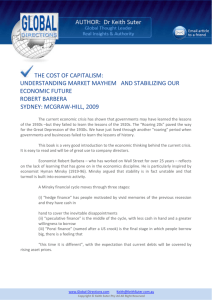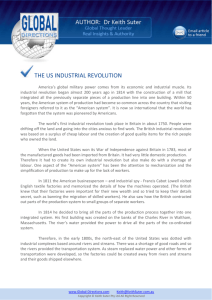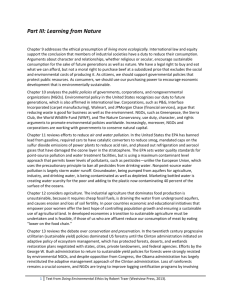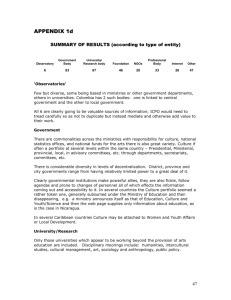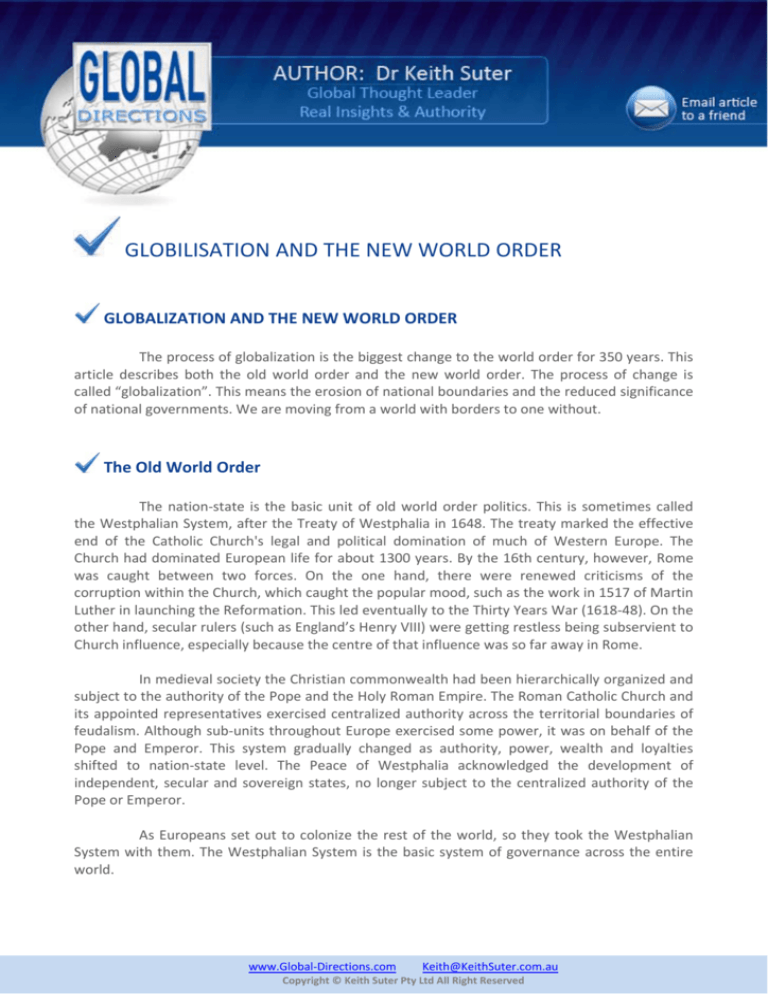
GLOBILISATION AND THE NEW WORLD ORDER GLOBALIZATION AND THE NEW WORLD ORDER The process of globalization is the biggest change to the world order for 350 years. This article describes both the old world order and the new world order. The process of change is called “globalization”. This means the erosion of national boundaries and the reduced significance of national governments. We are moving from a world with borders to one without. The Old World Order The nation‐state is the basic unit of old world order politics. This is sometimes called the Westphalian System, after the Treaty of Westphalia in 1648. The treaty marked the effective end of the Catholic Church's legal and political domination of much of Western Europe. The Church had dominated European life for about 1300 years. By the 16th century, however, Rome was caught between two forces. On the one hand, there were renewed criticisms of the corruption within the Church, which caught the popular mood, such as the work in 1517 of Martin Luther in launching the Reformation. This led eventually to the Thirty Years War (1618‐48). On the other hand, secular rulers (such as England’s Henry VIII) were getting restless being subservient to Church influence, especially because the centre of that influence was so far away in Rome. In medieval society the Christian commonwealth had been hierarchically organized and subject to the authority of the Pope and the Holy Roman Empire. The Roman Catholic Church and its appointed representatives exercised centralized authority across the territorial boundaries of feudalism. Although sub‐units throughout Europe exercised some power, it was on behalf of the Pope and Emperor. This system gradually changed as authority, power, wealth and loyalties shifted to nation‐state level. The Peace of Westphalia acknowledged the development of independent, secular and sovereign states, no longer subject to the centralized authority of the Pope or Emperor. As Europeans set out to colonize the rest of the world, so they took the Westphalian System with them. The Westphalian System is the basic system of governance across the entire world. www.TheGlobalFactor.com.au Keith@KeithSuter.com.au www.Global‐Directions.com Keith@KeithSuter.com.au Copyright © The Global Factor Pty Ltd All Right Reserved Copyright © Keith Suter Pty Ltd All Right Reserved No one suddenly decided in 1648 to create the Westphalian System. Indeed the date is somewhat arbitrary. Some countries are older, such as England, Spain and Portugal. By contrast, “Germany” seems to redraw its boundaries every generation or so (the last time being 1991). Problems with "Nation" The Westphalian System had some internal problems right from the start. What is notable, perhaps, is not that the system is now in decline ‐ but that it managed to last for so long. The "nation" part of the Westphalian System refers to a group of people who see themselves to be a particular group. The application of the definition, however, is often difficult. On the one hand, there is certainly something that provides a common bond. For instance, a tune ‐ which is not necessarily the official national anthem ‐ can bond a group of people. For example, Rule Britannia which is for most of the world's population who may hear it, a pleasant piece of music, is for a particular group of people a special tune and they need only to hear a few bars to feel misty‐
eyed (especially if they are overseas at the time). On the other hand, the term "nation" can be unclear. First, members of "nations" move around the globe. The British "nation" runs into hundreds of millions of people, with members in such countries as the US, Canada, South Africa, Australia and New Zealand. Much the same could be said about the Irish, French, Chinese and Indians. These people have, for hundreds of years, been moving overseas to take up such positions as traders, administrators, clerks, educators, soldiers, health practitioners, and missionaries. They have married and settled down, with their children thus having two sets of loyalty (and are often eligible to have two passports). Second, there is no international agreement on how nationality is acquired. British, Australian and US citizenships are acquired by residence in the countries and according to government criteria (which nowadays are largely based on the applicant's skills or the number of relatives already present in the country). At the other end of the spectrum, to become a Japanese citizen a person has to be born of parents whose own parents were Japanese (which explains why Japanese‐Koreans whose families have been resident in Japan for a century still do not have Japanese citizenship). Finally, there is the much narrower definition of a "nation" from the Boston‐based human rights non‐governmental organization Cultural Survival, which is concerned with the protection of indigenous peoples: “A nation is a group of people with a strong cultural and political identity that is both self‐defined and acknowledged by others. Nations are those groups that have exercised political control over their destinies at some point in the past and still see such control as a possible future strategy.” Such people – numbering about 350 million worldwide ‐ include the First Nations in the US and Canada. www.Global‐Directions.com Keith@KeithSuter.com.au Copyright © Keith Suter Pty Ltd All Right Reserved Problems with "State" A "state" is an organization for governing a set piece of the earth's surface (political, legal, military systems etc). The most obvious ambiguity is that the boundaries of a "nation" and a "state" do not always coincide. The best way to address this problem is by "ethnic cleansing" (killing or in other ways removing the other ethnic groups in a state's jurisdiction). A second ambiguity is that a "state" may have changing boundaries. One example concerns Germany, whose borders have been in flux over the centuries. Another example is Ruthenia (or Carpathian Russia). Felix Man, one of the pioneers of photo‐journalism, visited Ruthenia in the 1930s and his photographs record a long‐lost era . Ruthenia, with Uzhorod as its capital, had been part of the Hungarian Monarchy. In 1920, when Czechoslovakia was created, it became a province of Czechoslovakia. Under pressure from Hitler, it was given back to Hungary in 1938. After World War II, it was annexed by the then USSR to become part of the Soviet Ukraine. Within a generation, a citizen in the area would have had three very different nationalities. Australian anthropologist Bill Neville used Ruthenia's experience as the basis of a joke . A person dies and goes to heaven. He explains to St Peter: “I am Hungarian. I was born in the Austro‐Hungarian Empire; I lived for a time in Czechoslovakia; then I was in Hungary. Later I was in the Soviet Union and I died in the Ukraine”. St Peter marvels at the amount of travelling the person has done. The dead man replies: “On the contrary, this is the first journey out of my village”. Third, as the Cultural Survival list indicates, there are many "nations" which do not have "states", such as the Middle East's Kurds and the US and Canada’s First Nations ("Indians"). Fourth, is "United Nations" the correct name for the UN? The term indicates that the organization exists to unite people and in fact the Charter begins "We the Peoples of the United Nations determined..." But from then on "peoples" vanish from the text and the organization is solely an institution for states. Perhaps it should be called the "United States of the World"? Finally, there is also the confusing use of "state" as a term for the subordinate political unit within a "state". For example, the state of New York is within the state of the United States of America. The New World Order Nation‐states are having to share their power with new global actors: international (or more accurately "inter‐governmental") organizations (such as the United Nations), transnational corporations, and non‐governmental organizations (NGOs). www.TheGlobalFactor.com.au Keith@KeithSuter.com.au www.Global‐Directions.com Keith@KeithSuter.com.au Copyright © The Global Factor Pty Ltd All Right Reserved Copyright © Keith Suter Pty Ltd All Right Reserved Inter‐Governmental Organizations National governments have found it necessary to create international organizations to facilitate co‐operation across national frontiers. While most popular attention has been focussed on political and military co‐operation (such as UN peacekeeping operations) the real breakthroughs have been in economic and social co‐operation (“functional co‐operation”). The process has been underway for over 190 years. Rivers and diseases, for example, do not conform neatly to political boundaries. In 1815 the first permanent administrative body was set up by governments ‐ the Commission for the Navigation of the Rhine. A European Commission for the Danube was established in 1856. In the second half of the 19th century administrative co‐operation between governments began to take on a permanent form. The International Telegraphic Union (which is now a UN specialised agency) was established in 1865 with a permanent bureau and some participation by private telegraph companies. In 1874 there followed the Universal Postal Union (which is also now a UN specialized agency), also with a permanent bureau, and participation by postal administrations regardless of their political status and a system of financial contributions. World War I came as a great shock to everyone. No one expected such a large or lengthy conflict. There was widespread agreement that this should be the "war to end all war". Several unofficial groups (non‐governmental organizations) and individuals said the fault was due to the Westphalian System of competing nation‐states. The Westphalian System encouraged rivalry. The system itself was at fault and so there should be a new international system. The League of Nations began operations in 1920. It was designed principally as the place where two or more governments would bring their international disputes. It had no automatic right to intervene; governments had to agree to bring their disputes to it. Most governments did not. The League, then, was flawed from the outset. It was able to make some progress in functional co‐operation, such as world health, care of refugees, the suppression of slavery and the drug trade, the protection of minority populations, and improvements in employment conditions in factories and elsewhere. It settled, particularly in the 1920s, some international disputes. But once militarism built up in the 1930s in Japan, Italy and Germany, the League was powerless to stop the dictators because the member‐nations were reluctant, if not downright opposed, to introduce coercive measures. Consequently, the League ceased to have much political relevance by the early 1930s. The League's most significant impact was the way in which it convinced governments of the need to persevere with creating international organizations and the importance of functional co‐operation. www.Global‐Directions.com Keith@KeithSuter.com.au Copyright © Keith Suter Pty Ltd All Right Reserved The UN was created in 1945. It retained the League's basic structure but it has flourished in ways that the League was unable to (especially in economic and social co‐operation). But, at first sight, the UN remains locked into the Westphalian System. Governments use the UN not out of any sense of idealistic high‐mindedness (though the politicians will claim this in their rhetoric), but because the UN is a vehicle for national foreign policy. For example, no country is going to sign any international agreement that will be to its disadvantage. The UN is, however, helping to erode the Westphalian System. The mere fact that the UN exists is itself proof that governments (albeit reluctantly) acknowledge that they do need to work together on an increasing range of issues, such as health and protecting the environment. Other Inter‐Governmental Organizations International Governance is now a growth industry. The European Union (EU) is the world's best example of how a regional inter‐governmental organization is eroding the Westphalian System. The EU is a unique inter‐governmental organization. It is more than the confederal UN (where the authority resides largely at nation‐state level) and yet less than a federal nation‐state (such as the US). The EU began from a French proposal in 1950 to pool the coal and steel industries of France and the then West Germany into an organization open to all European democracies. The proposal had great symbolic significance: France and Germany had been at the centre of the two World Wars, and coal and steel are the basic industries for conventional warfare: the sinews of war. The European Coal and Steel Community was formed in 1951 with a membership of Belgium, France, West Germany, Luxembourg, Italy and The Netherlands. The success of this arrangement encouraged the six countries to apply the same approach to other parts of the economy. This led to the creation in 1957 of the European Economic Community (EEC). The EEC's membership and range of activities have continued to increase. But the EU has some problems. First, there is the problem of creating a sense of unity at the grass roots. Old hatreds (such as between France and Germany) are certainly dying but there is no new pan‐European nationalism emerging. Second, there is a debate over how the EU should evolve. On the one hand, there is a move for a "deeper" union, which would mean that the current member‐nations would pool more functions and co‐operate far more, such as the creation of a single EU foreign policy. On the other hand, there is a move for the current membership to become "wider" as it includes more of Eastern Europe. There is also the question of whether Turkey should become a member. Third, there is the problem of creating democracy and accountability within the EU. The real power resides with the European Commission at Brussels (rather than the European Parliament) and citizens feel isolated from the decision‐
making. www.TheGlobalFactor.com.au Keith@KeithSuter.com.au www.Global‐Directions.com Keith@KeithSuter.com.au Copyright © The Global Factor Pty Ltd All Right Reserved Copyright © Keith Suter Pty Ltd All Right Reserved But the EU has shown how the continent that pioneered the Westphalian System can now begin to move beyond it. It is a model for other regions around the world. Transnational Corporations A transnational corporation is a company that engages in foreign direct investment and owns (or controls) activities in more than one nation‐state. Transnational corporations are now the main global economic force. Transnational corporations have eroded the notion of a national economy; there is now only a global one. Transnational corporations sprawl across national political boundaries. Virtually the entire globe is now within reach of the corporations. Coca Cola, for example is now sold in more countries than there are UN member‐nations. Another development is that the corporations are staffed by a form of global "civil service", rather than "national" personnel. Corporations have been far more successful than the UN in encouraging their staff to see themselves as global workers rather than ones with national loyalties. The 50 biggest corporations are economically bigger than two‐thirds of the 192 UN’s member‐states. The impact of transnational corporations on the Westphalian System may be seen in three ways. First, global business has changed the pattern of economic relationships. We have come to the end of the era of local producers working for local markets. For a Briton to drive to the supermarket to buy food is in itself an experience in global trade (though the consumer would probably be unaware of it). Very little of the trip would be local: the consumer's wants, clothes, car, petrol, supermarket design, and supermarket products all have global dimensions. Second, the corporations not only do not need a host government to open up or guarantee foreign markets, they may do better on their own. National identification can be a burden. If a product is identified with a particular country (such as Coca‐Cola and the US) then a government may try to keep it out simply as being part of showing its displeasure with US foreign policy. It is notable that the few countries which do not permit Coke to be sold are all those which are antagonistic to the US (such as North Korea). Finally, national governments no longer have full national control over their economies. An example of this problem is the inability of governments to generate full employment. Many of the jobs lost in developed countries will never return. Jobs in the manufacturing industry are going the way of agricultural jobs: few people work on the land but those that do are now more productive than ever before. Much the same could be said for people working in factories in developed countries. Transnational corporations are encouraging the intertwining of national economies. They themselves move across national boundaries and so forge links between countries. They move jobs offshore. This intertwining then limits the scope of government action. www.Global‐Directions.com Keith@KeithSuter.com.au Copyright © Keith Suter Pty Ltd All Right Reserved There used to be periodic "Buy British" campaigns. The intention was that consumers should buy products made in their own country to help local employment. But transnational corporations have undermined the potential success of such campaigns. First, many consumers themselves are obviously uninfluenced by such campaigns. Consumers themselves are now "de‐
nationalized": they are global consumers. They want the best and cheapest products and are unconcerned where they come from. The exception to this trend are "conspicuous consumers" ‐ people who ostentatiously buy expensive products expressly to show that they have a great deal of money (often more dollars than sense). They are not interested in mixing with the common herd and so are not attracted to the cheapest items ‐ only the most expensive and least common. Thus, they buy exclusive French fragrances or Swiss watches. Second, consumerism is the leading edge of the globalized economy. Shopping seems to have become a primary cultural activity. People spend several hours a week doing various types of shopping, and they go to shopping centres more often than they go to church or synagogue. Some 93 per cent of American teenage girls surveyed in 1987 deemed shopping their favourite pastime. If you want to do well, sell people what they need; if you want to get rich, sell people what they want. The global consumer culture contains such everyday items as soft drinks (notably Coca‐Cola and Pepsi), McDonalds (there is a new store opening somewhere around the world every 15 hours), television programmes and pop music. There are also "tie‐ins", where two or more products run together to reinforce each, such as Harry Potter novels and toys. Another aspect is the creation of the global middle class. This class often has more in common with members of the middle class in other countries than they do with the working class/ peasants within their own country. For example, a US‐based corporation will be more concerned with selling to the emerging middle class in India or other parts of Asia, than it is to the people who cannot afford to buy its products in New York. Globalization goes better with Coke. Non‐Governmental Organizations A "non‐governmental organization" (NGO) is any organization outside the government (such as the public service, legal system and the defence forces) and business. The phrase "non‐
governmental" is in itself Westphalian: organizations are either "governmental" or they are not. Therefore new terms are emerging, such as “civil society organizations”. It is impossible to calculate the number of NGOs. They keep springing up in response to some need. There is no doubt that NGOs are increasing both in number and in membership. Practically all adults in developed countries (and many young people) belong to at least one NGO. NGOs go beyond the high‐profile advocacy or fund‐raising/ relief ones, like Amnesty International, Greenpeace, Friends of the Earth, OXFAM, and the national Red Cross Society. NGOs also include www.TheGlobalFactor.com.au Keith@KeithSuter.com.au www.Global‐Directions.com Keith@KeithSuter.com.au Copyright © The Global Factor Pty Ltd All Right Reserved Copyright © Keith Suter Pty Ltd All Right Reserved churches, trades unions, co‐operative societies and service clubs (such as Scouts, Girl Guides and Rotary), and community groups (such as Meals on Wheels, Lifeline telephone counselling services, Alcoholics Anonymous, and gardening and chess clubs). There is, then, a great deal of work done through NGOs. Most NGOs have been created in the past century or so. Many have been created since World War II. They are to be found in all aspects of life. Indeed, local and national political activities are increasingly about the competing pressures from NGOs. A parallel development to the decline in the significance of national governments, is the decline in the significance of political parties. Activists prefer to join single issue groups (NGOs). In other words, people are still active in political change. It is simply that they no longer see political parties as the best vehicle for that change. People are disenchanted that when their political party does get into power, it is often unable to introduce the policies they would like. This disappointment is due to the fact that – owing to globalization ‐ increasingly national governments are no longer masters of their own destiny. Additionally, party politics polarizes reach each issue. Opposition parties are virtually automatically obliged to oppose government policies in order to maintain their credibility as an "opposition". The mass media ‐ always on the watch for clash and conflict ‐ go to the opposition precisely to get a critical opinion of the government. By contrast, NGOs can bring people together across party lines to work for a greater goal. NGOs mobilize the community. They enable individuals to take an active role in working for a better society. One way in which this is done is through voluntary service. NGOs are a vehicle whereby people can volunteer their services. People will volunteer their time, money and gifts‐in‐
kind to NGOs ‐ but they will not volunteer to do the same for official government bodies. Volunteers play a very important role in NGOs. They provide supplementary services to the staff ‐ and, indeed, in small areas they are the closest thing to "staff". NGOs can themselves be very important to the volunteers. They provide volunteers with an opportunity to take an active role in community welfare. They also help the self‐image of volunteers who through (say) unemployment or retirement from the paid work force may feel marginalized and even unwanted. NGOs provide therefore a vehicle out of the self‐absorption and self‐obsession which characterize so much of contemporary life. NGOs show that a good way to bring about change is to establish a model of how they would like things to be. In other words, providing warnings is not enough: it is also necessary to provide an alternative. Thus, NGOs are often on the leading edge of change. Through their advocacy work, they provide innovations, fresh thinking and new visions. They ‐ rather than government ‐ often set the pace in public opinion, such as raising concern about the environment. www.Global‐Directions.com Keith@KeithSuter.com.au Copyright © Keith Suter Pty Ltd All Right Reserved NGOs survive the fads and fashions of governments; they outlive the terms of elected governments. They provide a continuity of care and a continued focus on social justice issues when governments might prefer to ignore those issues. People work in NGOs to make a difference. They are not there simply to make money (which is unlikely, given the salary scales). Volunteers donate their time and skills similarly to make a difference; there are many other activities which could take up their spare time. There is, then, a degree of commitment here which may be lacking in politicians and public servants who are simply doing their job. Politicians and public servants may be fine individuals, with a dedication to the task then occupying their time. But they are unlikely to be focussed on that task for long; they will be transferred or promoted elsewhere and new staff will arrive. NGOs keep on keeping on. Nation‐states, according to the concept of the Westphalian System, are the masters of their own destiny. This means that governments rarely admit that they have given in to NGO pressure. If they were to do so, then it would mean that governments were not really masters of their own destiny and they would have to admit this to the general public. Such an admission would also encourage other NGOs to be equally active in the expectation of changing government policy. It is also very difficult to follow a governmental decision‐making process to find out how any decision was made and what influenced whom. For example, Amnesty International, whose members write letters to governments asking for the release of political prisoners, is careful not to claim, that when its adopted prisoners are in fact released, this was due to Amnesty pressure. Amnesty International cannot establish a clear chain of causation between its campaign and the release of the political prisoner. Similarly, an NGO may advocate a policy change and a government may later change its policy ‐ but it is usually very difficult (if not impossible) to say precisely that one caused the other. This applies even for those of us involved at the centre of a successful NGO campaign. For example, there was an NGO campaign throughout the 1980s against mining in Antarctica. The NGO campaign initially seemed futile, with governments determined to go ahead with creating a treaty to mine mineral‐rich Antarctica. But then in the late 1980s there was an upsurge in concern generally about the environment. Suddenly the Australian and French governments completely changed their policies to also oppose mining. This killed the attempt to create a treaty to permit mining in Antarctica . The NGOs were triumphant ‐ but it is not easy to assess a chain of causation which links the NGO campaign with the governmental back down. NGOs cut across the Westphalian System in four main ways. First, they can provide an alternative focal point for loyalty, such as the peace movements in many countries which opposed the arms race in the 1980s. Citizens do not always think that their own governments know best. Indeed, some NGOs provide an alternative "foreign" policy which transcends national boundaries, www.TheGlobalFactor.com.au Keith@KeithSuter.com.au www.Global‐Directions.com Keith@KeithSuter.com.au Copyright © The Global Factor Pty Ltd All Right Reserved Copyright © Keith Suter Pty Ltd All Right Reserved such as NGOs working together in many countries to defeat the proposed treaty to regulate mining in Antarctica. National governments may not necessarily represent the views of their citizens on all issues ‐ hence the importance of NGOs. Second, NGOs show that governments no longer have a monopoly over information and ideas. For example, NGOs undertake public education work, such as alerting people to the dangers of pollution and generating new ideas for coping with problems. NGOs develop close ties with politicians and (even more importantly) public servants to work on new treaties etc. NGOs are adept at using the mass media for their campaigns. They sometimes challenge governments and corporations to do better. Third, NGOs provide an alternative route for people who wish to work for a better world. Political parties are not the sole route for working for that objective. Indeed, given the widespread disenchantment with politicians, NGOs are important avenues for peaceful social change. Finally, the importance of NGOs is being recognized in the inter‐governmental organizations which grant various forms of consultative status to NGOs to enable them to take part in the work of the organizations. Also, national government delegations sometimes contain NGO personnel. To conclude, no one knows for sure what the future world order will look like. But we do know that it will be in many respects different from today. Alongside the continued – but declining ‐ power of nation‐states and national governments, there are now inter‐governmental organizations, transnational corporations and non‐governmental organizations. Globalization is reshaping the world’s system of governance. Keith Suter’s new book is Teach Yourself Globalization (London: Hodder Education, 2006) ________________________ NOTES 1.
"A World of Nations" Annual Report, Boston: Cultural Survival, 1989, p 4. 2.
Felix Man Man With Camera, London: Secker & Warburg, 1983, pp 99‐106. 3.
Bill Neville "Treaties, Then and Now", National Outlook (Sydney), December 1994, p 32. 4.
Alan Durning "Asking How Much is Enough" in Lester Brown et al (Editors) State of the World 1991, New York: Norton, 1991, p 163. 5.
See: Keith Suter Antarctica: Private Property or Public Heritage? London: Zed, 1991. www.Global‐Directions.com Keith@KeithSuter.com.au Copyright © Keith Suter Pty Ltd All Right Reserved

